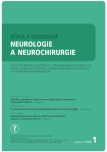Lokalizovaná neurofibromatóza typu 1 v mozaice
Autoři:
M. Schwarz 1; A. Vícha 2; K. Kuťková 3; L. Krsková 3; Š. Bendová 1; J. Zarzycka 1; P. Hedvičáková 1; M. Macek Jr. 1; M. Vlčková 1
Působiště autorů:
Department of Biology and Medical
1; Department of Pediatric Hematology, and Oncology, Charles University in, Prague, 2nd Faculty of Medicine and, University Hospital Motol, Prague, Czech, Republic
2; Genetics, nd Faculty of Medicine, Charles University in Prague and Motol, University Hospital, Prague, Czech, Republic
2; Department of Pathology and Molecular, Medicine, 2nd Faculty of Medicine, Charles University in Prague and Motol, University Hospital, Prague, Czech, Republic
3
Vyšlo v časopise:
Cesk Slov Neurol N 2022; 85(1): 80-82
Kategorie:
Dopisy redakci
doi:
https://doi.org/10.48095/cccsnn202280
Souhrn
Background: Neurofibromatosis type 1 is one of the more common rare disorders, and its atypical/segmental or mosaic forms are underdiagnosed. Thus far, only a few dozen cases of localized mosaic neurofibromatosis have undergone combined germline and somatic genetic testing for the NF1 gene. Methods: A 65-year-old female patient was referred to our center for multiple neurofibromas on her right shoulder with a clinical diagnosis of localized mosaic neurofibromatosis. One of the neurofibromas was surgically removed. Massively parallel sequencing and multiplex ligation-dependent probe amplification were utilized to identify the germline and somatic variants in the NF1 gene. Results: Heterozygous pathogenic NF1 gene variant c.7549C>T and multiple heterozygous intragenic NF1 gene deletions were detected in the DNA taken from the shoulder neurofibroma but not DNA from blood leukocytes or buccal smear. Conclusion: Germline and somatic genetic testing in localized forms of neurofibromatosis are advisable since it facilitates proper genetic counseling regarding risks to offspring who could inherit a germline pathogenic variant. Another important point to consider is cancer surveillance, which is often underutilized in mosaic forms of neurofibromatosis.
Zdroje
1. Riccardi VM. Early manifestations of neurofibromatosis: diagnosis and management. Compr Ther 1982; 8: 35–40.
2. Messiaen L, Vogt J, Bengesser K et al. Mosaic type-1 NF1 microdeletions as a cause of both generalized and segmental neurofibromatosis type-1 (NF1). Hum Mutat 2011; 32(2): 213–219. doi: 10.1002/humu.21418.
3. Friedman JM. Neurofibromatosis 1. In: Adam MP, Ardinger HH, Pagon RA et al (eds). GeneReviews®, Seattle (WA): University of Washington, Seattle; 1993. [online]. Available from URL: https://www.ncbi.nlm.nih.gov/books/NBK1109/.
4. Roth RR. Segmental Neurofibromatosis. Arch Dermatol 1987; 123: 917. doi: 10.1001/archderm.1987.01660310085020.
5. Redlick FP, Shaw JC. Segmental neurofibromatosis follows Blaschko’s lines or dermatomes depending on the cell line affected: case report and literature review. J Cutan Med Surg 2004; 8: 353–356. doi: 10.1007/s10227-005-0029-z.
6. Knudson AG. Mutation and cancer: statistical study of retinoblastoma. Proc Natl Acad Sci 1971; 68: 820–823. doi: 10.1073/pnas.68.4.820.
7. García-Romero MT, Parkin P, Lara-Corrales I. Mosaic neurofibromatosis type 1: a systematic review. Pediatr Dermatol 2016; 33(1): 9–17. doi: 10.1111/pde.12673.
8. Listernick R, Mancini AJ, Charrow J. Segmental neurofibromatosis in childhood. Am J Med Genet A 2003; 121A(2): 132–135. doi: 10.1002/ajmg.a.20183.
9. Marwaha A, Malach J, Shugar A et al. Genotype-phenotype data from a case series of patients with mosaic neurofibromatosis type 1. Br J Dermatol 2018; 179(5): 1216–1217. doi: 10.1111/bjd.16929.
10. Freret ME, Anastasaki C, Gutmann DH. Independent NF1 mutations underlie café-au-lait macule development in a woman with segmental NF1. Neurol Genet 2018; 4(4): e261. doi: 10.1212/NXG.0000000000000261.
11. Ko Y, Lee C, Lee H et al. Clinical application of next-generation sequencing for the diagnosis of segmental neurofibromatosis. J Dermatol Sci 2017; 88(3): 370–372. doi: 10.1016/j.jdermsci.2017.07.014.
12. Hida T, Idogawa M, Okura M et al. Genetic analyses of mosaic neurofibromatosis type 1 with giant café-au-lait macule, plexiform neurofibroma and multiple melanocytic nevi. J Dermatol 2020; 47(6): 658–662. doi: 10.1111/1346-8138.15327.
13. Friedrich RE, Hagel C, Kohlrusch FK et al. Mosaic neurofibromatosis type 1 with multiple cutaneous diffuse and plexiform neurofibromas of the lower leg. Anticancer Res 2020; 40(6): 3423–3427. doi: 10.21873/anticanres.14327.
14. Lobón-Iglesias MJ, Laurendeau I, Guerrini-Rousseau L et al. NF1-like optic pathway gliomas in children: clinical and molecular characterization of this specific presentation. Neuro-Oncol Adv 2019; 2 (Suppl 1): i98–i106. doi: 10.1093/noajnl/vdz054.
15. National Center for Biotechnology Information. ClinVar; [VCV000230467.13]. [online] Available from URL: https://www.ncbi.nlm.nih.gov/clinvar/variation/VCV000230467.13.
16. Spyk SL, Thomas N, Cooper DN et al. Neurofibromatosis type 1-associated tumours: Their somatic mutational spectrum and pathogenesis. Hum Genomics 2011; 5: 623–690. doi: 10.1186/1479-7364-5-6-623.
17. Consoli C, Moss C, Green S, et al. Gonosomal mosaicism for a nonsense mutation (R1947X) in the NF1 gene in segmental neurofibromatosis type 1. J Invest Dermatol 2005; 125: 463–466. doi: 10.1111/j.0022-202X.2005.23834.x.
18. Maertens O, De Schepper S, Vandesompele J et al. Molecular dissection of isolated disease features in mosaic neurofibromatosis type 1. Am J Hum Genet 2007; 81: 243–251. doi: 10.1086/519562.
19. Cohen PR. Segmental neurofibromatosis and cancer: report of triple malignancy in a woman with mosaic Neurofibromatosis 1 and review of neoplasms in segmental neurofibromatosis. Dermatol Online J 2016. doi: 10.5070/D3227031662.
20. Daly MB, Karlan BY, Pal T et al. NCCN Guidelines: Genetic/Familial High-Risk Assessment: Breast, Ovarian, and Pancreatic. [online].Version 2.2021 — November 20, 2020. Accessed 7.9.2021.
Štítky
Dětská neurologie Neurochirurgie NeurologieČlánek vyšel v časopise
Česká a slovenská neurologie a neurochirurgie

2022 Číslo 1
Nejčtenější v tomto čísle
- Vícečetná tumoriformní ložiska mozku jako první projev demyelinizačního onemocnění
- Spontánní intrakraniální hypotenze
- Novinky v liečbe hlbokou mozgovou stimuláciou pri neurologických ochoreniach
- Analytické a preanalytické aspekty stanovení lehkých řetězců neurofilament v biologických tekutinách
